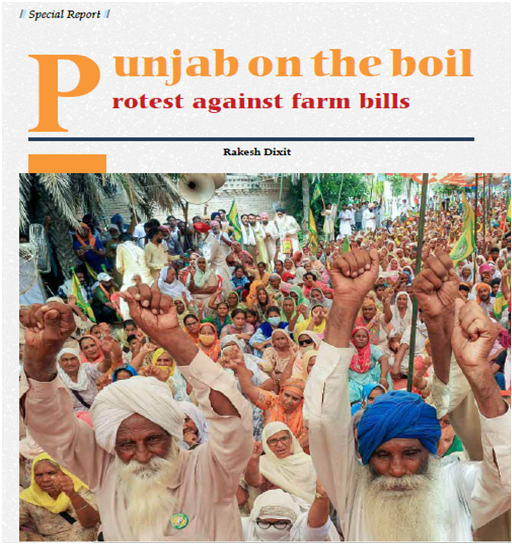
Punjab and Haryana, the two states known to be the leading contributors to the India’s bulging food grains stock are on the boil. Farmers of the two states have hit the streets in protest against three contentious farm sector bills passed by the parliament, and there are no signs of the agitation abating any time soon.
On September 25, close to 250 farmer bodies came together under the banner of All India Kisan Sangharsh Committee for a national strike, terming the laws as “anti-farmers” and asked the government either to withdraw these legislations or at least provide minimum support price (MSP) protection in them.
Farmers from various parts of the country are protesting against the three farm bills -- Essential Commodities (Amendment) Bill, 2020 the Farmers Empowerment and Protection) Agreement on Price Assurance and Farm Services Bill, 2020 and the Farming Produce Trade and Commerce (Promotion and Facilitation) Bill, 2020.
A day after the Parliament passed the contentious bills amid ruckus, the Congress announced to launch a nationwide agitation against them, and also initiated a campaign to collect two crore signatures of farmers and the poor against these proposed legislations. Punjab and Haryana have seen widespread protests since June when the bills had been promulgated in the form of ordinances. A ‘rail roko’ agitation against the farm bills has disrupted normal life in Punjab and Haryana since September 25.
Sarwan Singh Pandher, State Secretary of Kisan Mazdoor Sangharsh Samiti, says, “We will not allow any leaders of the political parties to address the farmers at the protest site. Our struggle will continue till recently passed farm bills are not withdrawn.
Earlier, Punjab Chief Minister Amarinder Singh had appealed to farmers not to stop traffic or violate Section 144 in the state over the agriculture bills, but made it clear that no cases would be registered against them as they were fighting for their lives. FIRs already registered against farmers protesting in violation of Section 144 would be withdrawn, said the Chief Minister. The farmers are violating the law as the bills will ruin them and their families, he said in response to a question.
According to the Chief Minister, the bills would pave the way for ending the Minimum Support Price (MSP) regime, which will spell doom for Punjab, and in fact the whole nation.
The resignation of Union Minister Harsimrat Badal from the Narendra Modi Cabinet signals unusually strong stand taken by her party, Shiromani Akali Dal, against a move taken by its long-time ally BJP. Akali Dal President Sukhbir Badal has said the party was never consulted on the Bills.
Interestingly, till recently, the Akalis had been defending the farm bills when they were yet to be passed in the parliament. Just before a one-day Punjab Assembly session on August 28, Sukhbir Badal had released a letter from Union Agriculture Minister Narender Singh Tomar saying the practice of procuring grains at a minimum support price (MSP) will remain unchanged. He had accused Chief Minister Amarinder Singh of misleading farmers. Now the two archrivals in Punjab are speaking in one voice against the bills. Peasantry forms the backbone of the Akali Dal vote-bank in Punjab. Sukhbir Badal says, “Every Akali is a farmer, and every farmer is an Akali.”
Farmer unions across the state have sunk their political differences to unite against the Modi government’s step for “heralding a new revolution in agriculture sector”. The 100-year-old Akali Dal, which had its poorest ever showing in the 2017 Assembly elections with a mere 15 seats out of 117, cannot risk alienating its core constituency. Political analysts say it’s a question of survival for the party that enjoyed two successive terms from 2007 before the 2017 rout. The SAD-BJP alliance secured only 15% of the seats while the Congress recorded its most emphatic win since 1957.
The farmers’ agitation has come as godsend for the Akalis. They were in the wilderness and no one thought they would ever oppose the BJP. This agitation has given them a new lease of life.
Various farmers' organisations are adamant on rollback of the three bills, which they claim, will pave the way for dismantling the minimum support price system, leaving them at the "mercy" of big corporates.
In the BJP-ruled state Haryana too, the Bharatiya Kisan Union has joined protests. Chief Minister Manohar Lal Khattar’s appeal for deferring the stir went unheeded. The Haryana Police has been conducting patrolling of the national and state highways and important roads in various parts of the state, including Ambala, Kurukshetra, Sonipat, Jind, Sirsa, Fatehabad, Hisar and Bhiwani. A leader of the farmers, Gurbachan Singh Chabba, says, these bills are for enabling loot by big corporates and companies.
The government, on the other hand, claims the bills would double farmers’ income through greater market access and unburden agricultural trade from all restrictions.
According to Union Agriculture Minister Narendra Singh Tomar, the bills seek to open up the farm sector to more competition, modernise supply chains by allowing bigger agribusinesses to engage directly with farmers and create seamless access to markets.
Critics, including opposition parliamentarians, however, say that the bills will dilute the country’s public procurement system and lead to exploitation by private companies.
Around 60 percent of India’s population depends on farming for livelihood and the government faces the tough task of pacifying this crucial segment of voters, already reeling under the impact of the coronavirus pandemic which had dealt a crippling blow to the economy.
Kapil Sibal Member of Rajya Sabha and Senior Congress leader while debating on Kisan issues has confirmed that there are almost eight middlemen between the farmer and the Government mandis. The act envisages to eliminate the middlemen which will affect many top leaders of Akali Dal and NCP.
Rakesh Dixit
To read the further articles please get your copy of Eastern Panorama October issue @http://www.magzter.com/IN/Hill-Publications/Eastern-Panorama/News/ or mail to contact @easternpanorama.in


